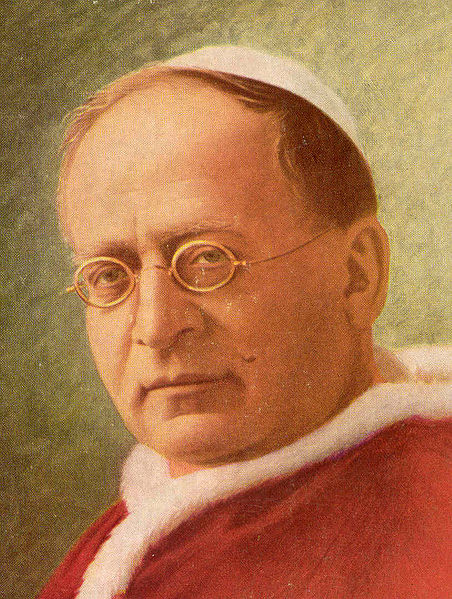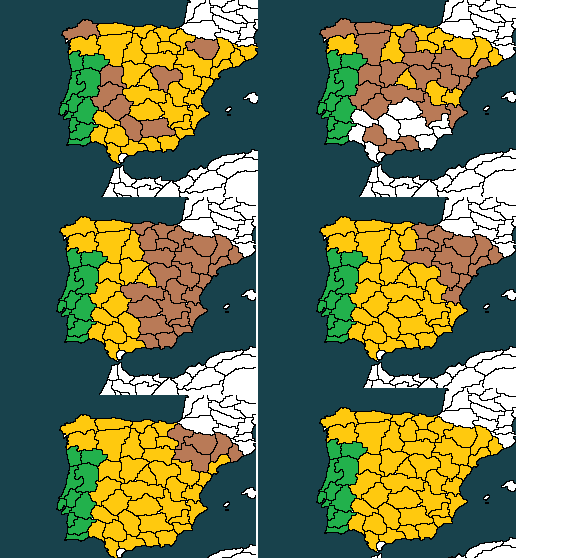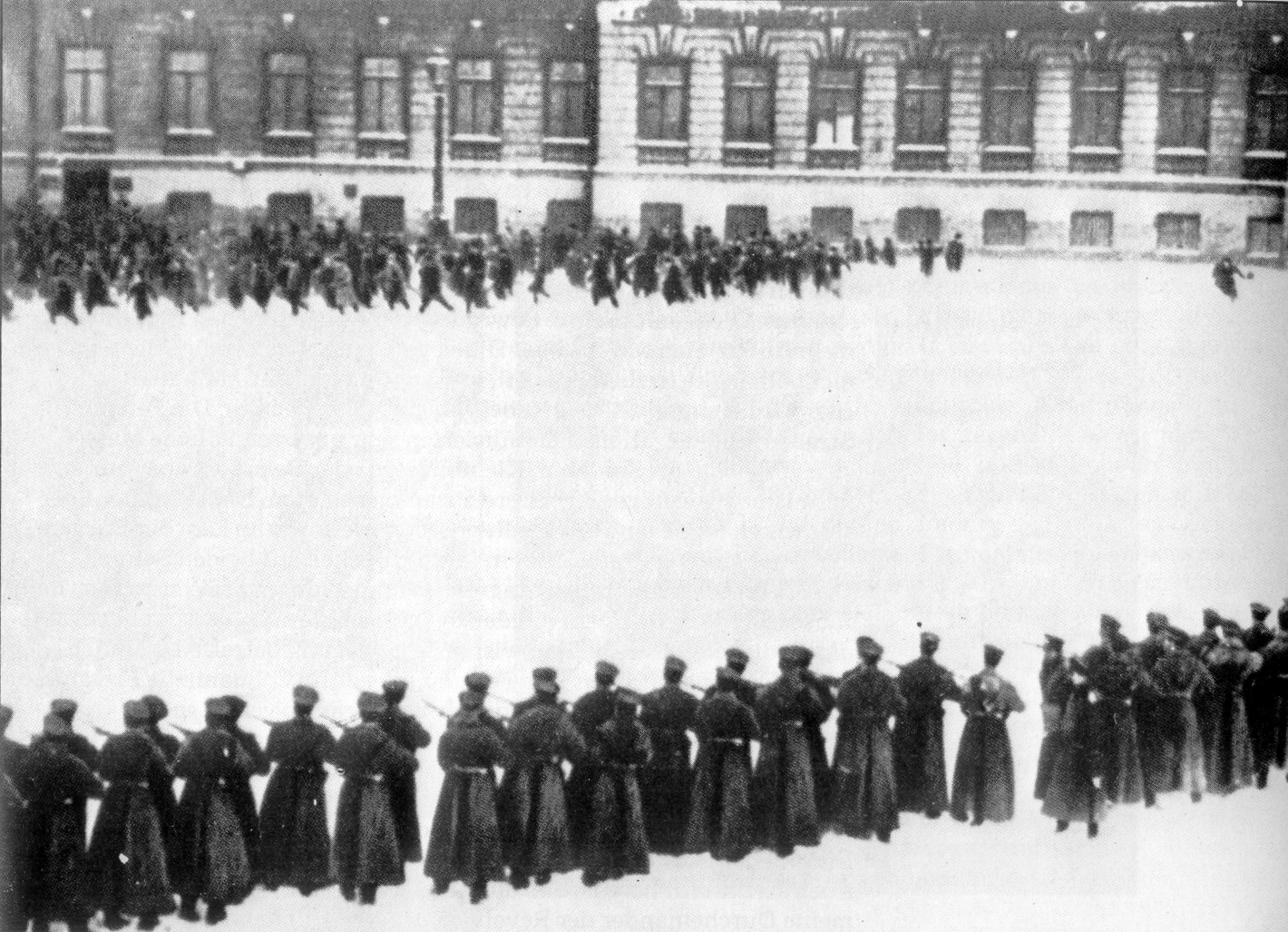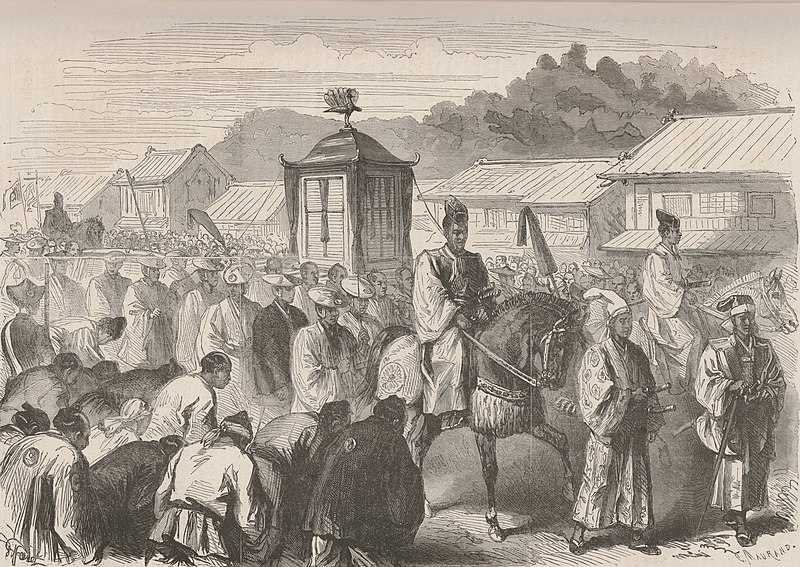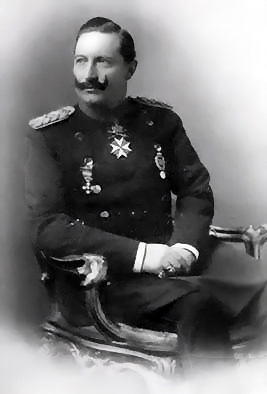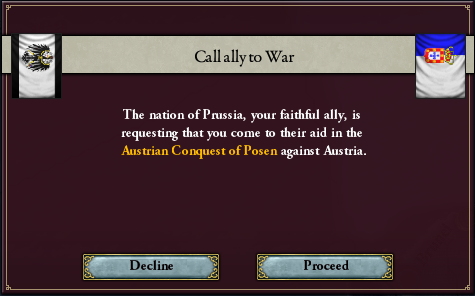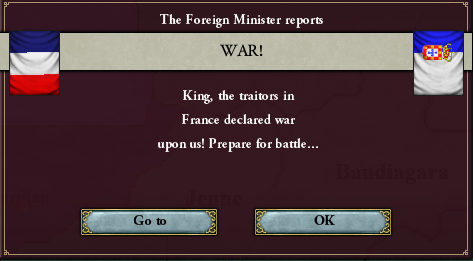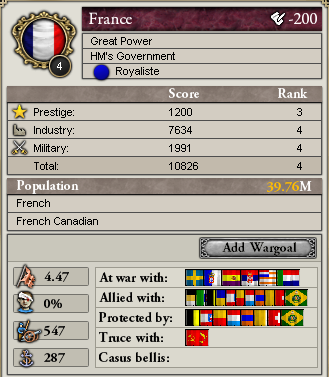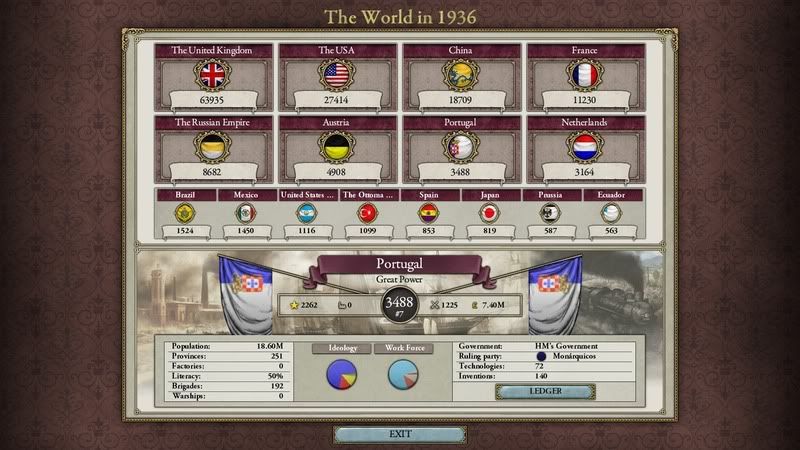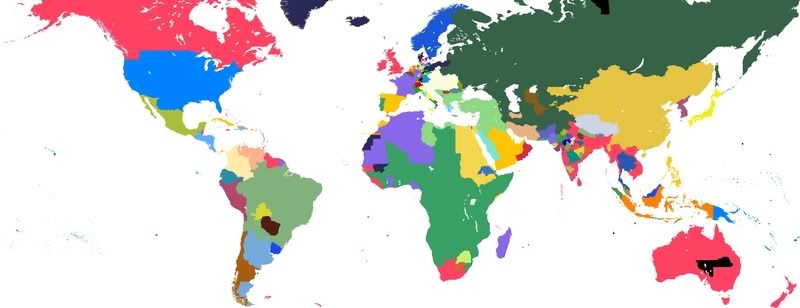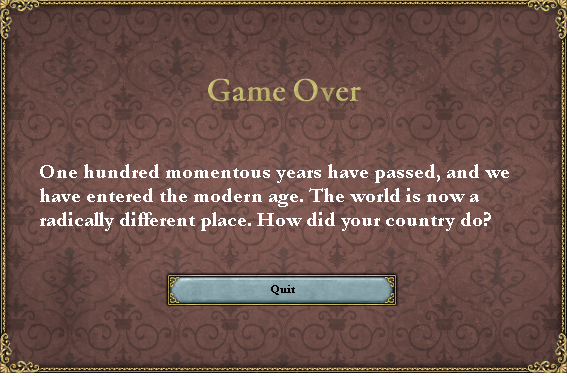Chapter IV
A New, New World
Portugal was the eighth most powerful and influential nation in the world, but it's position there was becoming more and more uncertain. Smaller nations rise up to the point where they can threaten Portugal much more frequently than anyone would like. Many would rather see a resurgence of Spain and viewed Portugal's ascension as an unnatural byproduct of an accident of circumstance. Nevertheless Portugal refused to give in to such jargon and plotted their own rise to power, with Luis was the one leading the way.
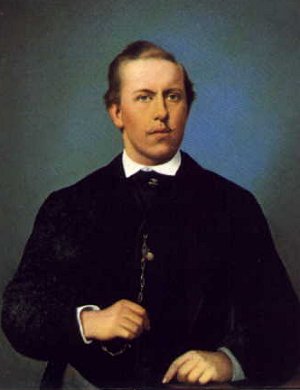
Dom Luis, King of Portugal and the Algarves, was in many ways the exact same as Portugal. Luis was never meant to be King. That was something his elder brother was bred and taught to be since birth. Luis was a man much more interested in the mysteries of life and the world than he ever could be with the dreary politics that are keeping Portugal afloat among the world powers. This was not necessary a bad thing as while Luis had no love for politics, he was more than interested in projecting the will of Portugal across the world. Over the past centuries many of the world's mysteries have been unlocked, but now there was something new and dangerous to explore and exploit. That would be the great continent of Africa.

Portugal had long since had a presence on the continent in it's colonies of Angora, Guinea, and Mozambique, along with it's recently acquired protectorate of Sokoto. Of all the Great Nations, Portugal had laid it's claim to the most of the lands inside the continent. Inside the early months of Dom Luis's rein, a number of expeditions set out to discover the secrets of the continent, many of them funded by the Portuguese imperial coffers. Among which was the ever important expedition to discover the source of the Nile river. The Nile river had long since been a mystery to the civilized world, being the only known river to actually flow north, unlocking the reason to this would be a great boon to not only Portugal but to the world.
The first two expeditions failed to secure any results. While one may wonder how hard it may be to simply follow a river to it's source, there are apparently many hundreds of small rivers that web into the Nile and which one that is the source is subject to much debate, argument, and mystery. Nevertheless another expedition set out with a full entourage of twelve Portuguese and several native guides to unlock the Nile's secrets. To the surprise of all, the expedition returned after just four months of traveling with the sound of success sticking to their exhalations. News of this discovery spread throughout the civilized world and many explorers came to envy Portugal's ever increasing support of expeditions into Africa when compared to their own nation's minor support in comparison.
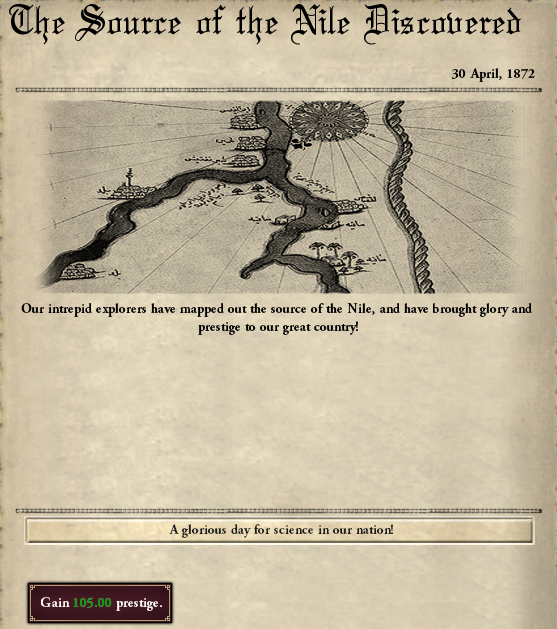
Besides the Nile the continent of Africa contained many secrets, among them would be that surrounding the nation of Egypt. It's ancient past holds many secrets and none of the population can remember anything about them. Many centuries of military conquests and regime changes has, from the perspective of many Europeans, dumbed down the population. They were a proud people, who built monuments higher than any building, structures sturdier than anything ever made before. Unlocking the secrets of ancient Egypt was among the many goals of Portugal. There were over two dozen different expeditions going on at any one time inside the nation attempting to uncover a new mystery. Unlock some strange new fact. Portugal met with limited success, until, perhaps, one of the most spectacular accidents to occurred.
An expedition by a man named Phillipe Maria set out from Cairo searching the desert sands looking for some clue to "The lost pyramid" or so it was called by the local populous. Maria got separated from his group following a run in with raiders. Left with no water and no supplies to speak of Maria wandered the desert looking for someone, anyone, to help. In his dehydrated state he came across a small opening inside a solid rock face. There he collapsed, but was helped by the local populous who discovered him near death. Immediately upon regaining consciousness Maria set out once again to discover what he saw before he nearly died, coming across a great dune of sand with a small piece of exposed Rock sticking out of one side. Maria began removing the sand and soon a solid rock face began to get exposed as the desert sands were slowly peeled back. In one week fully removed the sand exposing an entrance that was blocked off, there he immediately began to work on uncovering the way to get inside the structure calling it the most important thing this side of the Great Pyramid of Giza. After several weeks of work Maria finally entered the structure and news of this event spread like wild fire throughout the world. Portugal had financed the expedition and it became apparent that Portugal was heading up in the world.
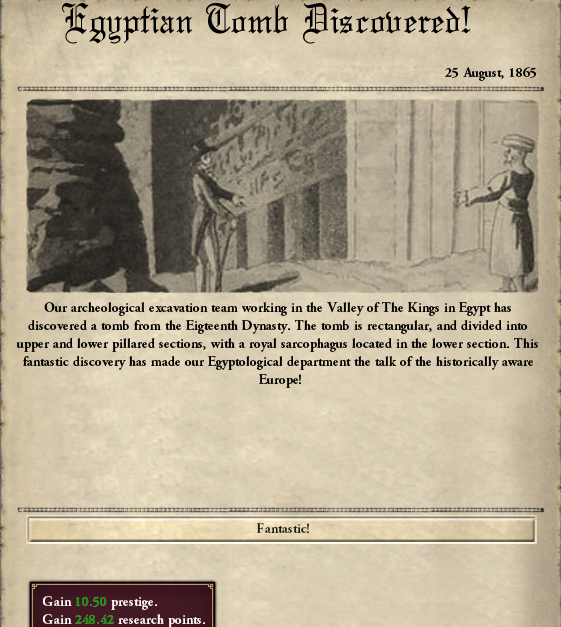
Scientific discovery was not the only thing Africa had to offer the Portuguese. Luis was eagerly beginning to expand his already extensive overseas possessions inside the continent. Many dozens of expeditions went deep within the African continent claiming great swaths of land in name of the Portuguese King and Portugal, offering them money and loans in return to people who often had no idea what to do with such items. The grab for Africa was well under way.
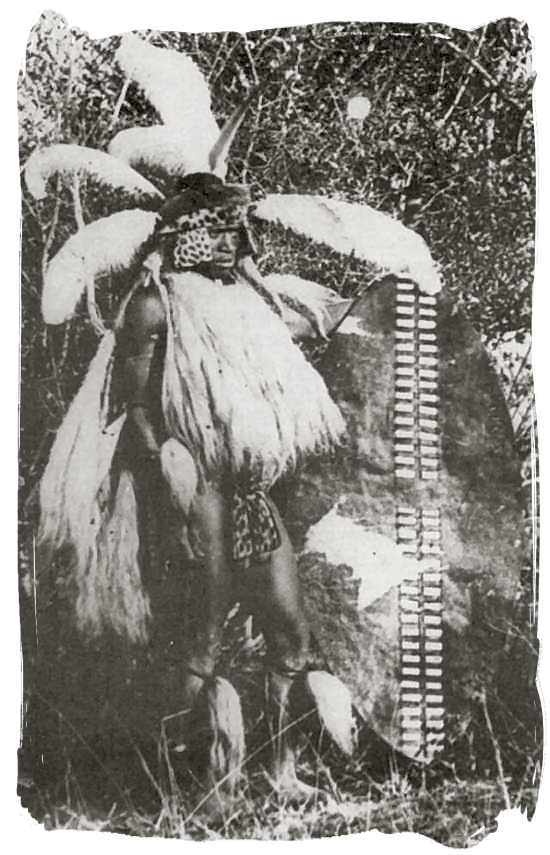
A Native Guide
Portugal had great ambitions inside the continent and by the turn of the decade much of the southern continent was within Portuguese hands, but things were changing. Nations that paid no attention to the great and vast continent of Africa now began to slowly devise plans for colonial conquest. Prussians, Spaniards, French, and British nations began to fight one another for land in the vastness of Africa. Portugal was focusing, busily, on securing the western half of the continent and linking all their colonial possessions, but once the other nations entered the game their resources dwarfed Portugal's. Luis was left with little to do except expedite the plans and quickly claim great lengths of land.
In 1886 Portugal attended the London conference, where Luis met with his aunt, Victoria, her Prime Minister, and several other prominent heads of state. There many of the defining borders were created with other regions left undefined for other nations to make their claims. Luis had attempted to lay claim to most of the continent south of Egypt, but was blocked by the other leaders stating it would give Portugal far too much power. Luis was reported to laugh and scoff off the argument by claiming that there are less than 27,000 Portuguese troops governing an area three times the size of France which has armies rumored in the hundreds of thousands with just half the territory. Still, Luis conceded to some requirements leaving much of the land in East Africa as undefined territory which can be claimed by whoever can establish control first. Prussia and France were fierce competitors for north Africa and Spain, while slightly interested in the African continent, was far more interested in establishing their rule throughout the middle east. Russia was invited to the conference but they claimed they had desires for Persia, not Africa.
Sardinia-Piedmont had attempted to gain several territories, but was blocked on several occasions by both France and Great Britain. Eventually their delegation left the conference when no progress could be made, but for the most part their territories inside Morocco were confirmed, more or less. The Netherlands had attempted to gain entry into the conference, but was rebuked after their recent war with Great Britain. The London Conference was a conference for friendly nations only. No action was taken against their territories, however. Austria had no desires to move in on Africa, for some reason they had become a stable power eager to form alliances with the other powers, but refusing to actually go to war with anyone. The Ottomans and Egypt were invited to the conference for little more than ceremony, neither would be increasing their territories nor removing their territories. They were long enough established to not be bothered, and no nation cared to have any wishes on their lands. However, the Ottomans had consistently attacked Egypt over the past half century and nearly all the great powers had intervened in their wars leaving the Ottoman Empire beaten. Both countries are effectively relegated to irrelevance.
Spain was of particular note to the conference, the monarchists had entered the conference with the prospect of increasing their lands there. They had captured some territories from the Sultanate of Oman and Morocco firmly establishing their presence on the continent, but they were far more interested in the Middle East, as already stated, but there was something else that was interesting. During the conference a great rebellion occurred inside continental Spain, the monarchists fled to Morocco while their capital fell to the rebels.
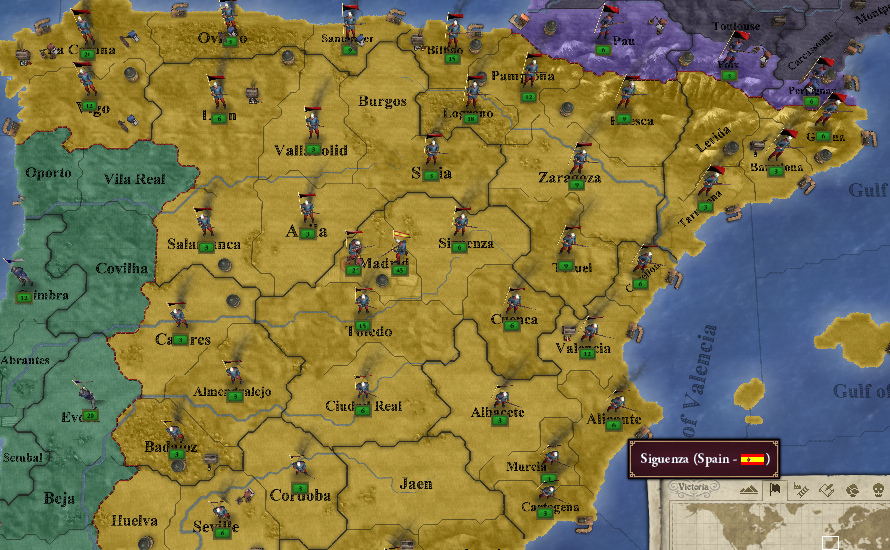
The Spaniards fought bravely, but in the end there was little they could do. The Entire country was broken in a maelstrom of death, chaos, and revolution. In the end there was little that could be done. A Portuguese expedition set out to relieve Madrid, but they were bogged down fighting Spanish troops, before they could make it to Madrid and restore the monarchy the worst thing that could have happened, happened. Total regicide of the Imperial family, thousands executed in bloody revolution in the name of founding a republic. The monarchists who had fled attempted to rally around a distant relative, but they were quickly overcame and a new Spain formed from the chaos.
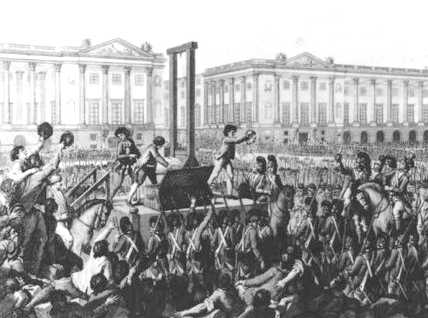
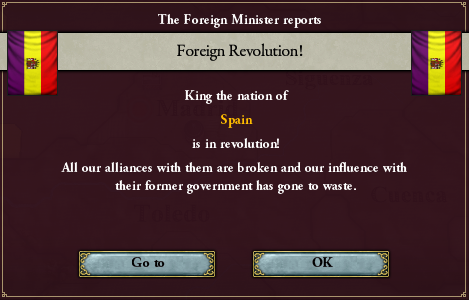
Portugal's own anarchists began contemplating total regicide and soon organized their own revolt to destroy the monarchy.
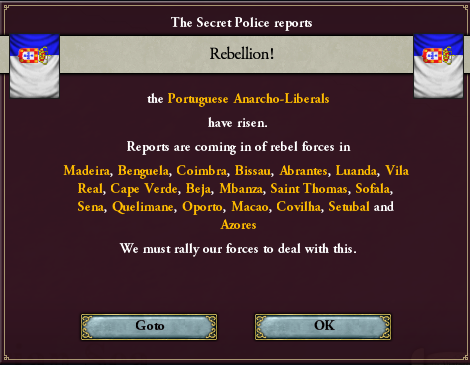
But the rebellion was short lived, and pitifully orchestrated. It did not take long for Luis to organize an army to fire down upon the rebels. While Portugal and it's closer colonies rebelled, much of Africa remained loyal and it's troop base quickly secured the continent for the monarchists. Luis quickly routed out all rebels and massacred them. There would be no mercy to those that would commit high treason. The entire rebellion had taken only six months to quell, and the only territory that succumbed was the distant island of Saint Thomas. The conference in London was barely interrupted by the affair, Spain's government changed hands and they began their conquest of Nedj. It was if no blood was spilled at all. The London conference left much of the continent unsettled and many disputes still intact, but it had given us a picture of the continent.
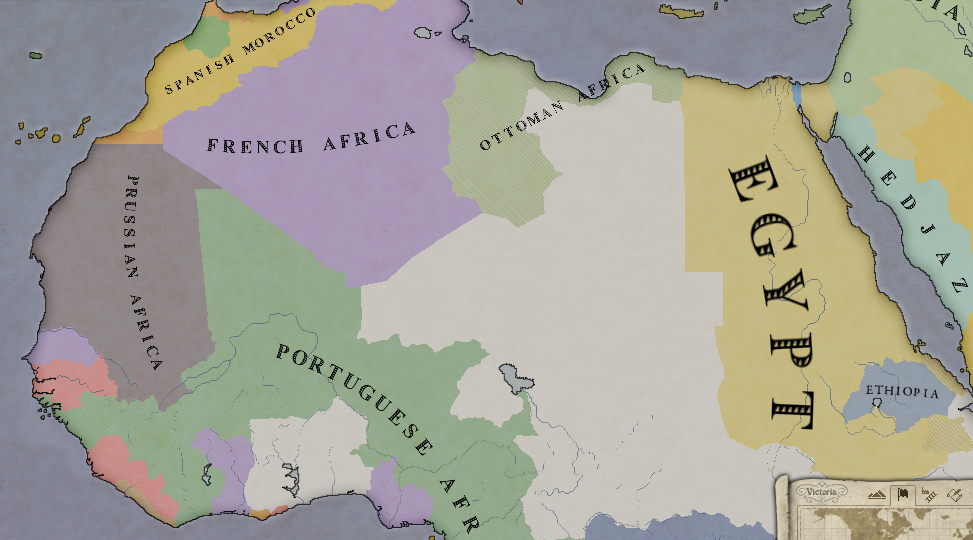
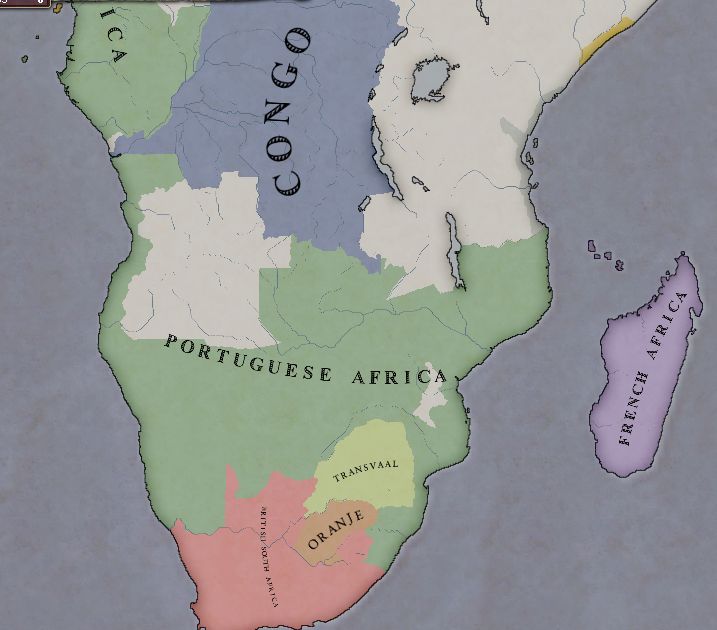
The Congo, however, organized a rebellion. Long after the nation partially colonized by Portugal the nation formed a rudimentary government under a Prussian constitution. it appeared out of nowhere, and despite it's eager pleas to avoid war with Portugal, war was declared immediately following the conference. The Congolese army was no match for the Portuguese military. But there was the long and tedious problem of conquering the jungles with only three detachments of soldiers. Nevertheless the Congo was subdued, stripping it down to it's capital and surrounding territories only to annex it five years later. The Congo never should have declared independence.
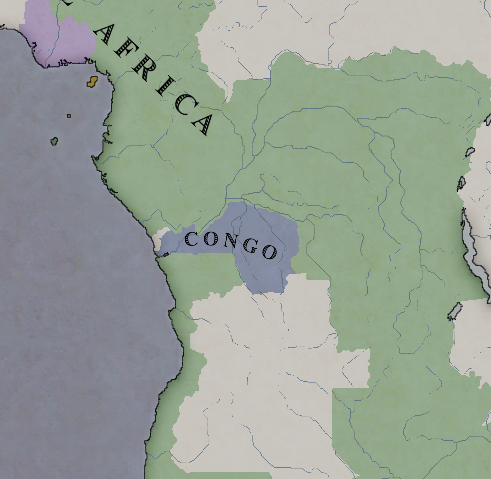
Over the course of the next few decades the world began to change, the Netherlands joined the ranks of the great powers after the fall of the Ottomans. Securing their sphere in the form of the republican dictatorship inside Spain, who for all intents and purposes had been abandoned by Portugal. China has become a civilized nation. It currently ranks number 9 on the list of powers. Lucca is a communist dictatorship... so far it's the only one. Perhaps most interesting is the final piece of Africa being claimed in the name of Portugal in 1912 setting off roaring crowds in Lisbon. Portugal controls more land than any other nation in the world, except Great Britain. Now Portugal is at the passing of the old age and at the beginning of the new. So many more challenges lay ahead of Portugal and there remains so little time. Luis had brought this nation to it's height in terms of size. Now it's time to industrialize and with that comes even greater challenges.
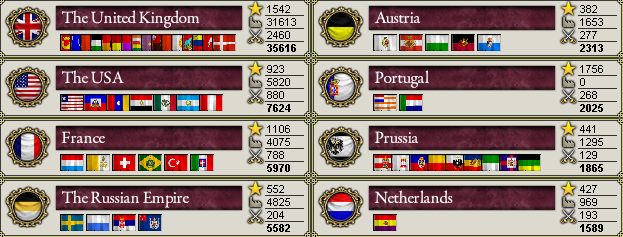
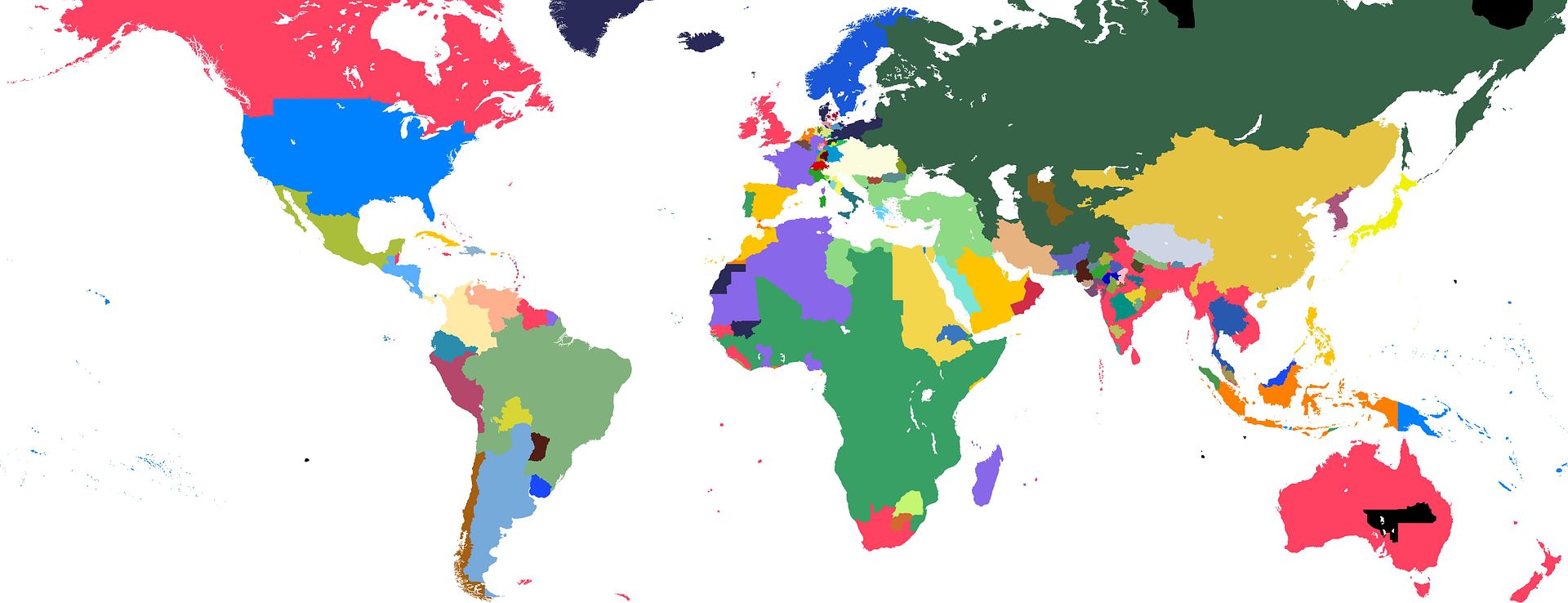
A New, New World
Portugal was the eighth most powerful and influential nation in the world, but it's position there was becoming more and more uncertain. Smaller nations rise up to the point where they can threaten Portugal much more frequently than anyone would like. Many would rather see a resurgence of Spain and viewed Portugal's ascension as an unnatural byproduct of an accident of circumstance. Nevertheless Portugal refused to give in to such jargon and plotted their own rise to power, with Luis was the one leading the way.

Dom Luis, King of Portugal and the Algarves, was in many ways the exact same as Portugal. Luis was never meant to be King. That was something his elder brother was bred and taught to be since birth. Luis was a man much more interested in the mysteries of life and the world than he ever could be with the dreary politics that are keeping Portugal afloat among the world powers. This was not necessary a bad thing as while Luis had no love for politics, he was more than interested in projecting the will of Portugal across the world. Over the past centuries many of the world's mysteries have been unlocked, but now there was something new and dangerous to explore and exploit. That would be the great continent of Africa.

Portugal had long since had a presence on the continent in it's colonies of Angora, Guinea, and Mozambique, along with it's recently acquired protectorate of Sokoto. Of all the Great Nations, Portugal had laid it's claim to the most of the lands inside the continent. Inside the early months of Dom Luis's rein, a number of expeditions set out to discover the secrets of the continent, many of them funded by the Portuguese imperial coffers. Among which was the ever important expedition to discover the source of the Nile river. The Nile river had long since been a mystery to the civilized world, being the only known river to actually flow north, unlocking the reason to this would be a great boon to not only Portugal but to the world.
The first two expeditions failed to secure any results. While one may wonder how hard it may be to simply follow a river to it's source, there are apparently many hundreds of small rivers that web into the Nile and which one that is the source is subject to much debate, argument, and mystery. Nevertheless another expedition set out with a full entourage of twelve Portuguese and several native guides to unlock the Nile's secrets. To the surprise of all, the expedition returned after just four months of traveling with the sound of success sticking to their exhalations. News of this discovery spread throughout the civilized world and many explorers came to envy Portugal's ever increasing support of expeditions into Africa when compared to their own nation's minor support in comparison.

Besides the Nile the continent of Africa contained many secrets, among them would be that surrounding the nation of Egypt. It's ancient past holds many secrets and none of the population can remember anything about them. Many centuries of military conquests and regime changes has, from the perspective of many Europeans, dumbed down the population. They were a proud people, who built monuments higher than any building, structures sturdier than anything ever made before. Unlocking the secrets of ancient Egypt was among the many goals of Portugal. There were over two dozen different expeditions going on at any one time inside the nation attempting to uncover a new mystery. Unlock some strange new fact. Portugal met with limited success, until, perhaps, one of the most spectacular accidents to occurred.
An expedition by a man named Phillipe Maria set out from Cairo searching the desert sands looking for some clue to "The lost pyramid" or so it was called by the local populous. Maria got separated from his group following a run in with raiders. Left with no water and no supplies to speak of Maria wandered the desert looking for someone, anyone, to help. In his dehydrated state he came across a small opening inside a solid rock face. There he collapsed, but was helped by the local populous who discovered him near death. Immediately upon regaining consciousness Maria set out once again to discover what he saw before he nearly died, coming across a great dune of sand with a small piece of exposed Rock sticking out of one side. Maria began removing the sand and soon a solid rock face began to get exposed as the desert sands were slowly peeled back. In one week fully removed the sand exposing an entrance that was blocked off, there he immediately began to work on uncovering the way to get inside the structure calling it the most important thing this side of the Great Pyramid of Giza. After several weeks of work Maria finally entered the structure and news of this event spread like wild fire throughout the world. Portugal had financed the expedition and it became apparent that Portugal was heading up in the world.

Scientific discovery was not the only thing Africa had to offer the Portuguese. Luis was eagerly beginning to expand his already extensive overseas possessions inside the continent. Many dozens of expeditions went deep within the African continent claiming great swaths of land in name of the Portuguese King and Portugal, offering them money and loans in return to people who often had no idea what to do with such items. The grab for Africa was well under way.

A Native Guide
Portugal had great ambitions inside the continent and by the turn of the decade much of the southern continent was within Portuguese hands, but things were changing. Nations that paid no attention to the great and vast continent of Africa now began to slowly devise plans for colonial conquest. Prussians, Spaniards, French, and British nations began to fight one another for land in the vastness of Africa. Portugal was focusing, busily, on securing the western half of the continent and linking all their colonial possessions, but once the other nations entered the game their resources dwarfed Portugal's. Luis was left with little to do except expedite the plans and quickly claim great lengths of land.
In 1886 Portugal attended the London conference, where Luis met with his aunt, Victoria, her Prime Minister, and several other prominent heads of state. There many of the defining borders were created with other regions left undefined for other nations to make their claims. Luis had attempted to lay claim to most of the continent south of Egypt, but was blocked by the other leaders stating it would give Portugal far too much power. Luis was reported to laugh and scoff off the argument by claiming that there are less than 27,000 Portuguese troops governing an area three times the size of France which has armies rumored in the hundreds of thousands with just half the territory. Still, Luis conceded to some requirements leaving much of the land in East Africa as undefined territory which can be claimed by whoever can establish control first. Prussia and France were fierce competitors for north Africa and Spain, while slightly interested in the African continent, was far more interested in establishing their rule throughout the middle east. Russia was invited to the conference but they claimed they had desires for Persia, not Africa.
Sardinia-Piedmont had attempted to gain several territories, but was blocked on several occasions by both France and Great Britain. Eventually their delegation left the conference when no progress could be made, but for the most part their territories inside Morocco were confirmed, more or less. The Netherlands had attempted to gain entry into the conference, but was rebuked after their recent war with Great Britain. The London Conference was a conference for friendly nations only. No action was taken against their territories, however. Austria had no desires to move in on Africa, for some reason they had become a stable power eager to form alliances with the other powers, but refusing to actually go to war with anyone. The Ottomans and Egypt were invited to the conference for little more than ceremony, neither would be increasing their territories nor removing their territories. They were long enough established to not be bothered, and no nation cared to have any wishes on their lands. However, the Ottomans had consistently attacked Egypt over the past half century and nearly all the great powers had intervened in their wars leaving the Ottoman Empire beaten. Both countries are effectively relegated to irrelevance.
Spain was of particular note to the conference, the monarchists had entered the conference with the prospect of increasing their lands there. They had captured some territories from the Sultanate of Oman and Morocco firmly establishing their presence on the continent, but they were far more interested in the Middle East, as already stated, but there was something else that was interesting. During the conference a great rebellion occurred inside continental Spain, the monarchists fled to Morocco while their capital fell to the rebels.

The Spaniards fought bravely, but in the end there was little they could do. The Entire country was broken in a maelstrom of death, chaos, and revolution. In the end there was little that could be done. A Portuguese expedition set out to relieve Madrid, but they were bogged down fighting Spanish troops, before they could make it to Madrid and restore the monarchy the worst thing that could have happened, happened. Total regicide of the Imperial family, thousands executed in bloody revolution in the name of founding a republic. The monarchists who had fled attempted to rally around a distant relative, but they were quickly overcame and a new Spain formed from the chaos.


Portugal's own anarchists began contemplating total regicide and soon organized their own revolt to destroy the monarchy.

But the rebellion was short lived, and pitifully orchestrated. It did not take long for Luis to organize an army to fire down upon the rebels. While Portugal and it's closer colonies rebelled, much of Africa remained loyal and it's troop base quickly secured the continent for the monarchists. Luis quickly routed out all rebels and massacred them. There would be no mercy to those that would commit high treason. The entire rebellion had taken only six months to quell, and the only territory that succumbed was the distant island of Saint Thomas. The conference in London was barely interrupted by the affair, Spain's government changed hands and they began their conquest of Nedj. It was if no blood was spilled at all. The London conference left much of the continent unsettled and many disputes still intact, but it had given us a picture of the continent.


The Congo, however, organized a rebellion. Long after the nation partially colonized by Portugal the nation formed a rudimentary government under a Prussian constitution. it appeared out of nowhere, and despite it's eager pleas to avoid war with Portugal, war was declared immediately following the conference. The Congolese army was no match for the Portuguese military. But there was the long and tedious problem of conquering the jungles with only three detachments of soldiers. Nevertheless the Congo was subdued, stripping it down to it's capital and surrounding territories only to annex it five years later. The Congo never should have declared independence.

Over the course of the next few decades the world began to change, the Netherlands joined the ranks of the great powers after the fall of the Ottomans. Securing their sphere in the form of the republican dictatorship inside Spain, who for all intents and purposes had been abandoned by Portugal. China has become a civilized nation. It currently ranks number 9 on the list of powers. Lucca is a communist dictatorship... so far it's the only one. Perhaps most interesting is the final piece of Africa being claimed in the name of Portugal in 1912 setting off roaring crowds in Lisbon. Portugal controls more land than any other nation in the world, except Great Britain. Now Portugal is at the passing of the old age and at the beginning of the new. So many more challenges lay ahead of Portugal and there remains so little time. Luis had brought this nation to it's height in terms of size. Now it's time to industrialize and with that comes even greater challenges.


Last edited:




